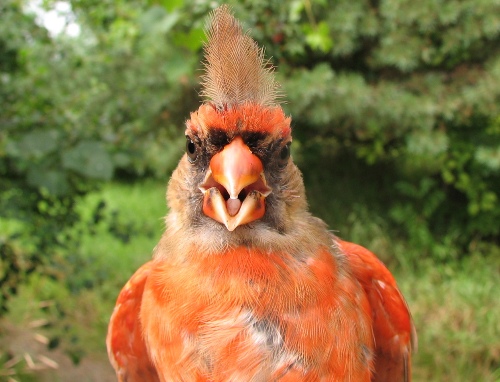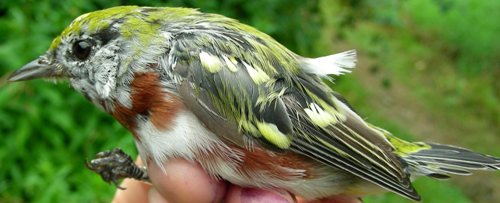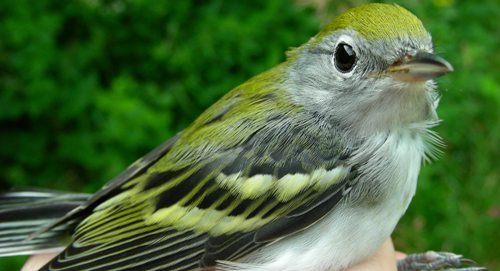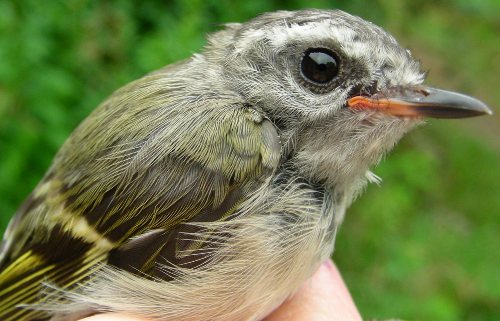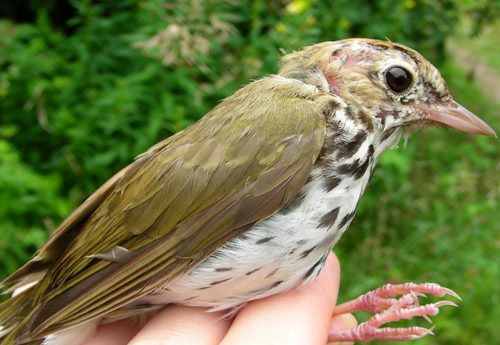|
McGILL BIRD OBSERVATORY |
||||||||||||||||||||||||||||||||||||||||||||||||||||||||||||||||||||||
Welcome
to the McGill Bird Observatory weekly report.
Click here for a complete listing of our archives.
Banders-in-charge: Barbara Frei, Marie-Anne Hudson Notes: MBO’s third full fall season got off to a very busy start on Wednesday, with 62 birds banded! We were sort of expecting a busy day since we had quite the first day last year, but the birds really outdid themselves this time, with moulting Tennessee Warblers and young Nashville Warbler appearing in our nets on our very first day of the fall season (reinforcing our reason for starting so early!). Like last year though, the pace didn’t keep up, and with almost two days rained out due to an explosive thunderstorm, heavy rain, and several others hot and humid days, we closed out the week with 187 new birds banded, only slightly behind last year. Species banded for the first time in 2008 included Northern Cardinal, Black-capped Chickadee, and Ovenbird, which failed to find their way to the nets during the spring season. In addition, we had some returning visitors new for the site, namely a Trail’s Flycatcher repeat and a returning Ovenbird, which we have not seen since it was banded as an after-hatch year bird in September 2005! Some more highlights of the week included a rather ‘gros’ Rose-breasted Grosbeak day, with 12 young birds caught in 2 net rounds! Big thanks to Gay Gruner for risking fingers to help extract and band them all! Many young Baltimore Orioles, Common Yellowthroats, Yellow Warblers and other young birds are around, so we are happy to know the MBO and Arboretum residents bred successfully this summer. Another (less painful) surprise was two young Golden-crowned Kinglets fresh out of the nest, which must have called the conifers in the Arboretum home this summer - the surprise being that the past two years, our first sightings of the fall season were on September 20 and 25, respectively.
This week’s top ten is very interesting. Compared to last fall, the top 4 species are relatively similar, with the minor exception of Yellow Warblers and Song Sparrows jostling for the top spot (this year Yellow Warblers have it, while last year it was Song Sparrows by almost twice the number!). Yet the remainder of the birds, save our faithful Black-capped Chickadees were not on our list last year at all. The 5th spot goes to Gray Catbird, another local breeder in our shrubby habitat. Their position on the top 10 banded listed would come as no surprise to any of our volunteers on the site this week, for it is hard to walk a net round without at least a couple individuals ‘meowing’ from the bushes. The Tennessee Warblers, Traill’s Flycatchers, and White-throated Sparrows are species that usually come in decent numbers later in the month, so its seems migration is on the move a bit early for some species this year.
Comparatively, the top 10 observed species shows quite a bit more overlap with last years numbers, with several of the more common breeders or residents as the main players. Here the biggest difference is a drop in abundance for certain species, namely the blackbirds. Red-winged Blackbirds and Common Grackles were far scarcer this week than week 1 in 2007, and we have yet to see some larger flocks that we are accustomed to seeing gracing the treetops of MBO. All in all we've had a very good start to our fourth complete fall season (fifth overall)! We are all very excited for another season of banding and bird observation at the site. As we continue to grow and age as a station we gather a wealth of information and it becomes more and more interesting to look back over the years and see what population fluctuations and patterns emerge. We are entering a crucial time for data collection that will serve for future conservation planning. We are again so thankful to our wonderful volunteers that brave weather, bugs, and early morning to come and share the work and amazing experiences with us every day. We look forward to sending you future updates as our fall season continues, stay tuned! Last but not least, a very special thanks to Paul Meldrum, Macdonald campus farm manager, for coming and mowing our paths on his own time. Thank you Paul, our paths have never been easier to walk!
|

